The disagreements in western christianity are growing into a deep schism. If we don’t want a complete split to occur, both sides need to act Real Soon Now. But at present there’s not a lot of communication happening.
But maybe a split is necessary ….. and unavoidable?
I believe it is all about who is the real Jesus and who is doing their best to follow Jesus in today’s complex world. Read on to see why.
A tale of two books
This post was “inspired” by two books I haven’t read. I’m basing my comments on the publisher’s text, which is obviously aimed at encouraging people to buy, plus reading parts of the books online and checking out a few interviews and reviews.
Our local christian bookshop sends me notices on Facebook, and recently two books were recommended to me. (Koorong must have no idea about me!)
The enemy within the church
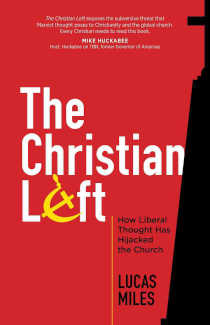
The Christian Left aims to help christians “identify and refute the lies of the Christian Left”, which has “invaded” and “hijacked” the church.
In all seriousness, the author claims the Christian Left has exchanged “the Trinity of the Father, Son, and Holy Spirit for the trinity of diversity, acceptance, and social justice”.
To be fair, the author also says Jesus “is neither left nor right but the embodiment of truth and grace”, and reviewers say he offers criticism of both sides of politics.
But the book is specifically about the “Christian Left”, it has a hammer and sickle on the cover and is being marketed as an expose of what the author sees as a dishonest christian left agenda, so its main message is clear.
Further, in interview, Lucas Miles accuses the left of wanting to “destroy the family”, “divide the church”, “redefine every single doctrine”, and so on. So leftist christians are either part of that, he is saying, or being duped by that agenda. So we can be clear what he is claiming.
It’s not the only book with this message, it seems. Several other books quickly showed up when I went to the bookseller’s page.
Fault Lines appears to be specifically about Marxism in the church while Gathering Storm is concerned with all secular worldviews in the church.
So it is clear that these concerns are widespread and run deep.
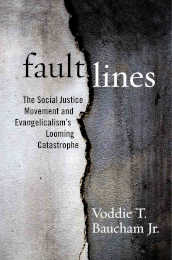
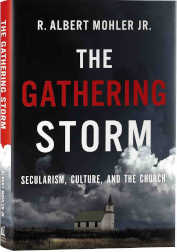
The enemy without
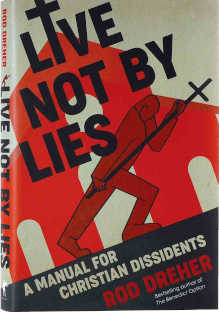
Live not by Lies, written by author of The Benedict Option says it is a “Manual for Christian Dissenters”.
That subtitle was a promising start. But the publisher’s blurb identifies: “telltale signs of “soft” totalitarianism cropping up in America”.
The problems he sees include civil liberties, identity politics, progressives, a corporate surveillance state and demagogic manipulation. All this is likened to Soviet totalitarianism and the persecution inflicted on “clergy, laity, martyrs, and confessors“.
I do think that some of the problems he identifies are real. But it seems that he focuses mostly on non-christian worldviews on the left or progressive side and misses the problems coming from the other side. For example:
- Surely the most recent (and current) example of a demagogue isn’t from the progressive side at all but former President Trump who is generally supported by conservative christians!?
- And surely identity politics isn’t as much of a threat to democracy as voter suppression, refusal to accept the court-validated election results and attempts to stop the result by force and threat and lies, which also comes from the conservative side of politics?
Even this sympathetic review by Trevin Wax for The Gospel Coalition says the author has not balanced the threats to christianity he sees from the left of politics with the equally obvious threats from the right, and he criticises his use of fear as a tactic.
But unlike The Christian Left, this book doesn’t take aim so much at fellow christians, but at secular movements.
And again, this isn’t the only book on this theme.
Both these books identify secular forces the authors believe are opposed to christianity – gender fluidity, same-sex marriage, abortion, political villains with malice and greed, “eroding morals, a Godless culture, and a declining national spirit”.
Progressive christians will likely agree about some of these issues, but not others.
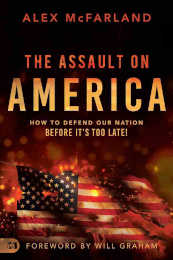

Areas of legitimate difference
There will always be disagreements over some important aspects of christian living. Those who believe the Bible, as they interpret it, provides clear and timeless instructions about ethics, will generally emphasise issues of gender, sexuality, abortion, marriage and family, and hold strongly held views. Those who believe the Bible presents principles that have to be applied to our own situation may conclude differently on some of these matters, and may emphasise other issues, like inequality, racism, war and environment.
The differences should be recognised and discussed – and prayed about, together.
But beyond these matters, there are some significant concerns about the basis of these books.
5 reasons to be concerned
I have no reason to doubt the sincerity of these authors. But I feel they may have been seduced into ignoring fundamental christian ethical teachings to pursue an agenda that is only partly christian.
1. Perfect love casts out fear
The approach of the publishers (and presumably all these the books too) seems to be based on making people fearful. Fear is a strong emotion that can be used to manipulate opinion or sell books, but one of the most repeated commands in the entire Bible is “Fear not!”. The Holy Spirit moves us beyond fear to faith and sound thinking (2 Timothy 1:7).
The love of God casts out fear (1 John 4:18). Any approach to christian faith and action that is based on fear is problematic and likely harmful.
2. Slander without factual basis
Calling progressive christian beliefs “lies” is terribly wrong for a christian. A lie is a deliberate falsehood. Even if Lucas Miles believes progressive christians are mistaken, he cannot know why progressive christians believe what they do. Better, surely, is to be charitable and accept their genuineness. Such slanderous language isn’t helpful and is contrary to scripture (e.g. 1 Corinthians 13:5-6, Romans 14:4, Colossians 3:8).
Likewise accusations by Lucas Miles of disbelief in the Trinity need to be very carefully made, if at all. Old fashioned liberalism, as espoused for example, by Bishop John Spong, may have denied the Trinity (at least in the form believed by evangelicals), but I don’t recall reading any progressive christians who do so. And I know many (including me) who assent to the doctrine.
And unfortunately these aren’t the only exaggerations and distortions.
3. Broad labels mask untruths
Most of these books, as far as I can tell, identify “progressive” as “leftist”, and hence as “Marxist”. Commonly, if someone they oppose believes something that Marxists believe, then they label that person as a Marxist too. I have analaysed this a lot more in Cultural Marxism & Christianity, where I argue this is fallacious. By the same logic, a Marxist who believes the same on some issue as a christian is therefore a christian??
We need fairer and more accurate analysis than this, for example:
- Jesus spoke about care for the poor, as does the rest of the Bible. If a christian tries to put that into practice, and supports some form of welfare, that is a christian value which happens to coincide to some degree with a Marxist value. Putting a Marxist label on that christian is slanderous and untrue. It only serves a divisive purpose.
- Jesus, and the Bible generally, say a lot about sexual ethics, but they also say a lot more about money and wealth, dishonesty in business, caring for the poor and the marginalised, etc (e.g. Amos 5:10-24, Matthew 25:31-46, Luke 12:13-21, James 5:1-6). How is it that these conservative christians focus on sexual ethics and say little about these other matters, and in fact sometimes dismiss them as socialist?
So it seems to me that the use of labels like “socialist” actually conceal truth and may allow some christians to avoid Biblical teachings on wealth.
4. The weapons of this world?
It is easy to notice how media and social media have become more combative in recent decades. Opinion leaders have found that it is easy to lock people into their point of view if they identify their tribe, demonise the opposition, divide people into two opposing groups and set up a warlike mentality. Both left and right do it. It is nasty, but it is effective.
But Scripture warns us not to use “the weapons of the world” (2 Corinthians 3:3-5). We are to value truth and avoid speaking badly of others (Ephesians 4:15, 1 Corinthians 13:4-6, Romans 12:9, 17).
I feel sad that in the strength of their feelings about the diminishing influence of christianity, these christian brothers and sisters have been led into using such methods – demonising christians who see the faith and their mission differently by calling them Marxists, deepening divisions when they should be trying to reduce them. By all means they should stand up to what they believe (though I hope they are prayerfully questioning if there is anything they should modify), but this needs to be done in love and truth.
5. Shallow christian thinking?
I feel these christians have misunderstood what the christian faith is all about.
- They seem to want to patriotically protect America as a christian nation. But christianity was born in a people who were subject to a pagan nation, and it thrived. We are to seek first the kingdom of God, and America isn’t the kingdom. By all means vote as conscience leads, but forcing other people into quasi-christian behaviour isn’t God’s way for us.
- They see threats to the family from gay marriage and gender politics, when these things need not be a threat to any christian family. Our trust in God and his ways can continue regardless of what the rest of the world does.
These are mistaken responses to the secular world. We don’t advance the kingdom of God by being judgmental about non-christians’ behaviour. We cannot force people to believe, and making laws so they conform to christian ethics is likely to push them further away.
Tim Keller has a better idea when he tells about people learning to “live with humility, patience, and tolerance in our time”.
Jonathan Wilson-Hartgrove sees a better path that leads away from culture wars and attempts to “consolidate power, stoke fears” and so hear “God’s call to love and justice in the world”.
These conservative authors seem to have a narrow view of christian faith that has replaced much of the willingness to love and serve without judgment with christian nationalism and narrow Biblical interpretation. That is a statement that I can’t unpack here, but I have tried at other times (see references below).
Where will it end?
Throughout christianity’s two millennia, God has brought change again and again through reformation and creative movements within the church and outside it. Some of these changes, like Jesus’ teaching on the kingdom of God, weren’t well received by the established religious leaders of their time.
I believe we are going through another time of change. I believe many (not all) of the things US conservatives fear are in fact from God. (Of course, they would draw attention to heresies down through the ages, and argue that is what is happening now. The question is, who is right?)
I believe the movement to a more servant-hearted christianity is a Spirit inspired movement and I believe it will continue. And unless conservative christians choose to dial down the outrage and engage prayerfully, and progressive christians also join in discussion and prayer, the western Protestant church will split into two quite separate communities. (I have argued this before – see links below.)
I don’t think the required change will happen, because in the end I think the barrier is already too wide and positions have become entrenched. I suspect the conservative group would prefer the split occurs because they can then remain “pure”.
The stakes are high, and each “side” presuming they are right on everything won’t take us anywhere good. Prayer, reflection, humility and openness are needed.
Read more on this site
- Don’t miss the moment – two brief visions point to a looming challenge for the church.
- Next steps along the way – a respected evangelical author offers a path to a new Christianity.
- When Jesus becomes a slogan – a tribal totem rather than Saviour and Lord?
- Christian nationalism: will the true christians please stand up! – what is our true priority?
- Christians and cultural Marxism – an assessment of this divisive issue.
Photo by Alex Green on Pexels.





Thee is a lot to consider in what you have written, too much for a humble secular person like me to digest !
I’ve probably said it before but I think we need the Christian Left more than we need the (so called) Christian right although I think that term is an oxymoron.
There are obviously extremes in all religions, I don’t think for example you would convince most people who have worked hard to get ahead to give away all their worldly possessions to the poor, although some obviously give away a great deal of wealth while maintaining a comfortable lifestyle themselves.
The most difficult issue I believe is abortion. Might this be one point of agreement between the Christian Left and Right ? I don’t see too many Christians on either side campaigning in favour of it. Campaigning in favour it seems is mainly done by secularists on the basis of individual rights.
I’d be interested to hear your views as a Christian Left representative.
Hi “West”, sorry to delay replying. I don’t think I received the advice of your comment as I should have.
Yes, I think the gap between left and right is increasing, even among christians. But it will only be harder to deal with if either or both sides insults and overstates their criticisms of the other.
Abortion is an interesting issue as you say. I think progressive christians are split on this. Some (like me) are not happy to support abortion except in extreme cases. They/we may not actively oppose it, because it seems unlikely to have any impact, and more likely to antagonise, but we feel it probably isn’t ethically right. But there are also progressive christians who support the woman’s right to choose so strongly that they don’t oppose abortion.
Some other important aspects are (1) natural miscarriages far outnumber human induced abortions, and (2) in the US states with stronger anti-abortion laws have more abortions than those with more liberal laws. If we have a problem with abortion, it really matters how we express that. Caring for the poor, supporting unmarried pregnant girls, better sex education, etc, are all more important than legal and moral opposition.
What are your thoughts?
Hi Unklee,
Obviously abortion is a difficult issue.
I tend to the position that abortion is murder, however I’m not a woman and I don’t really feel I have the right to tell a woman that she should carry an unwanted child. Cases of pregnancy after rape must be horrendous for a woman or girl and in those circumstances I would not blame a woman for wanting an abortion.
Where the pregnancy was unexpected , but the result of a consensual act then support for the woman (and also her partner who should not be allowed to avoid responsibility) should be provided before abortion is considered.
I don’t really believe that abortion on demand should be supported by the State (except in extreme circumstances like rape or a threat to the mothers health)., it really makes it too easy to simply dismiss the problem without proper consideration. State support should be provided in the form of counselling and financial assistance in raising the child or finding adoptive parents.
I think we are fairly close in our views on this, thanks for your thoughts.
Hi West, sorry again for delay. Things still aren’t working right on this blog at the moment. I’m working on getting the comment system set up properly, something seems to be broken.
Anyway, thanks for your thoughts. Yes I think our views are close. I think for me, the most important fact is we don’t really know whether the unborn child is fully human and therefore abortion is murder. I think it may be, perhaps probably is, but I don’t know. But likewise I don’t think either “pro choice” or “pro life” groups can be certain, yet they act as if they are sure.
I think atheists can reasonably say there isn’t anything sacred about human life, although most probably wouldn’t think that. But for me as a christian, human life is sacred, and so in uncertainty, I wouldn’t want to take the risk of taking a sacred life.